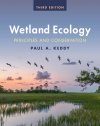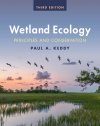![Wetland Ecology Wetland Ecology]()
Click to have a closer look
About this book
Contents
Customer reviews
Biography
Related titles
About this book
Richly illustrated and packed with numerous examples, this unique global perspective introduces wetland ecology from basic principles to advanced applications. Thoroughly revised and reorganised, this new edition of this prize-winning textbook begins with underlying causal factors, before moving on to more advanced concepts that add depth and context. Each chapter begins with an explanation of the basic principles covered, illustrated with clear examples. More difficult concepts and exceptions are introduced only once the general principle is well-established.
Key principles are now discussed at the beginning of Wetland Ecology: Principles and Conservation, and in order of relative importance, enabling students to understand the most important material without wading through complex theory. New chapters on wetland restoration and wetland services draw upon practical examples from around the world, providing a global context, and a new chapter on research will be particularly relevant to the advanced student planning their own studies.
Contents
Preface
1. Wetlands: an introduction
2. Flooding
3. Fertility
4. Natural disturbance
5. Competition
6. Herbivory
7. Burial
8. Other factors
9. Diversity
10. Zonation
11. Services and functions
12. Research: paths forward
13. Restoration
14. Conservation and management
References
Index
Customer Reviews
Biography
Paul A. Keddy is an independent researcher who was a full professor at the University of Ottawa and then the first holder of the Schlieder Endowed Chair for Environmental Studies at Southeastern Louisiana University. He has published more than 100 scholarly papers on plant ecology and wetlands, as well as serving organizations such as NSF, NSERC, World Wildlife Fund and The Nature Conservancy. His first edition of Wetland Ecology: Principles and Conservation won the Society of Wetland Scientists' Merit Award. He has won multiple other prizes, most recently a Meritorious Service Medal from the Governor General of Canada. His other Cambridge University Press publications include The World's Largest Wetlands (2005), Plants and Vegetation (2007), Plant Ecology (2017), and A Framework for Community Ecology (2021).
By: Paul A Keddy(Author)
581 pages, colour photos, colour & b/w illustrations, colour tables
"[...] The aim of this text is to explore these diverse ecosystems from three perspectives [...] This is a broad remit for a text positioned as an introduction and yet there is merit in the case. We need to appreciate the sheer diversity of wetland types and their concomitant ecological processes. [...] For an introductory text, this is a fascinating exploration of the topic"
– Paul Ganderton, The Niche 55(1), spring 2024
"Keddy's new version of Wetland Ecology is even more readable, not stuffy; it successfully strives for comprehension, not memorization, imbued with questions and principled hypotheses to guide experiments and syntheses. He retrieves both older and newer writings as a scientist first, and also as a citizen-scientist with affection for personal curiosity and society."
– R. Eugene Turner, Louisiana State University, USA
"This new edition is essential reading for all those around the globe interested in wetlands. The book emphasizes general principles and causal factors responsible for shaping natural wetlands and how they apply to restoration and conservation. Dr Keddy recalls how the old foundational studies contributed to building current understandings of wetland ecology. Numerous illustrations and probing concluding questions at the end of each chapter make the book a valuable teaching resource."
– Barry G. Warner, University of Waterloo, Canada
"In this third edition of Wetland Ecology: Principles and Conservation, Dr Paul Keddy has once again shown his strong understanding of how wetlands function. Rather than minor changes and edits to the second edition, this is a reorganized and rewritten expansion, with new sub-sections that delve further into the subject matter. Reference to the classical wetland literature is retained, but wetland science is brought up to date with references through 2022. New examples are included to help explain principles, and a concerted effort was made to use international examples. The effect of humans on wetland functions is prominent in many sections. Most figures are now in colour, and many excellent colour photographs have been added to assist in understanding of the text. Inclusion of insightful questions after each chapter helps to make this book an excellent text for use in undergraduate and graduate courses."
– Douglas Wilcox, SUNY Brockport, USA
"This is the most comprehensive book in wetland ecology. It explores the diversity and complexity of wetlands, covering a wide range of topics from ecology and functioning to restoration and conservation. These topics are presented clearly, they are superbly illustrated and organized in a way that makes this textbook of equal value to both students and researchers. A must-have book for anyone interested in wetlands."
– Vasilis Louca, University of Aberdeen, UK



































